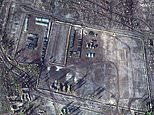Russian tensions with US over Ukraine could see a repeat of the Cuban missile crisis, Moscow warns
Russian tensions with US over Ukraine could see a repeat of the Cuban missile crisis that brought the world to the brink of nuclear war, Moscow warns
Deputy foreign minister Sergei Ryabkov warned standoff was ‘entirely possible’Russian troops are building up on the border with Ukraine, sparking concernsJoe Biden said the US would take a more direct role in the border tensiosn
<!–
<!–
<!–<!–
<!–
(function (src, d, tag){
var s = d.createElement(tag), prev = d.getElementsByTagName(tag)[0];
s.src = src;
prev.parentNode.insertBefore(s, prev);
}(“https://www.dailymail.co.uk/static/gunther/1.17.0/async_bundle–.js”, document, “script”));
<!–
DM.loadCSS(“https://www.dailymail.co.uk/static/gunther/gunther-2159/video_bundle–.css”);
<!–
Russia has warned the escalating tensions with the US over Ukraine risked repeating the 1962 Cuban missile crisis.
‘You know, it really could come to that,’ deputy foreign dinister Sergei Ryabkov was quoted as saying by Interfax.
‘If things continue as they are, it is entirely possible by the logic of events to suddenly wake up and see yourself in something similar.’
Russia has warned the escalating tensions with the US over Ukraine risked repeating the 1962 Cuban missile crisis. Pictured: Russian troops amassing on a camp in Voronezh
He was referring to the 1962 standoff between the United States and the Soviet Union that brought the world to the brink of nuclear war.
The comment comes amid concerns in the West over a Russian troop buildup near Ukraine.
Moscow has expressed alarm at Ukraine’s closer ties with NATO and also accused Kyiv of a troop buildup.
On Thursday, Germany’s new foreign minister warned Russia that it would pay a ‘high political and economic price’ if it made any militaristic moves against Ukraine.
Annalena Baerbock, speaking in Paris while making her first foreign trip a day after taking office, emphasised the need to coordinate a common European position when dealing with hostile neighbours such as Russia.
General Valery Gerasimov, chief of the Russian General Staff, called media reports about Russia allegedly preparing an attack on Ukraine ‘a lie’ and said that Ukraine was to blame for escalating tensions in its war-torn eastern industrial heartland, known as Donbas, by deploying new weapons there.
Ukrainian soldiers walk past destroyed buildings on the front line amid fears of a Russian invasion
Gen. Gerasimov warned Kyiv against using force in the area. ‘Any provocations by Ukrainian authorities to settle the Donbas problems with force will be suppressed,’ he said at a briefing with foreign military attaches.
Russia and Ukraine have been locked in a bitter tug-of-war since 2014, when Moscow annexed the peninsula of Crimea and threw its weight behind a separatist insurgency in eastern Ukraine. The fighting between Ukrainian forces and Russia-backed rebels has since killed more than 14,000 people.
Tensions have reignited this year amid reports of a Russian troop buildup near Ukraine’s border.
US President Joe Biden said this week the US would take a more direct role in diplomacy to address Putin’s concerns over Ukraine and Europe at large, part of a broader effort to dissuade the Russian leader from ordering a destabilising new invasion of Ukraine.
US intelligence officials have determined that Russia has stationed about 70,000 troops near its border with Ukraine and has begun planning for a possible invasion as soon as early next year.
Moscow has denied plans to attack Ukraine and in turn alleged that Kyiv might try to reclaim the areas controlled by the rebels. Ukrainian officials have denied an intention to do so.
President Putin has urged the west to provide guarantees that would preclude Nato from expanding to Ukraine and discussed the tense situation around Ukraine with President Biden on Tuesday.
President Biden, as well as officials in Europe, warned President Putin that Russia could face painful economic consequences if it invaded Ukraine.
![]()


